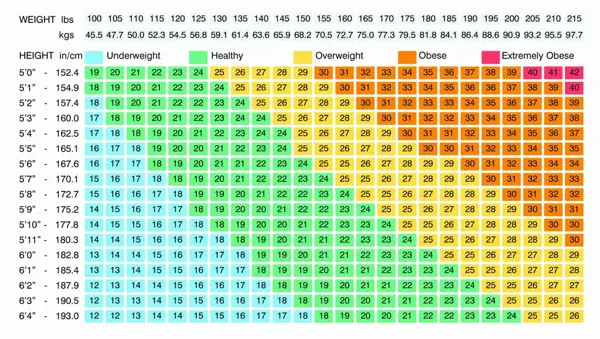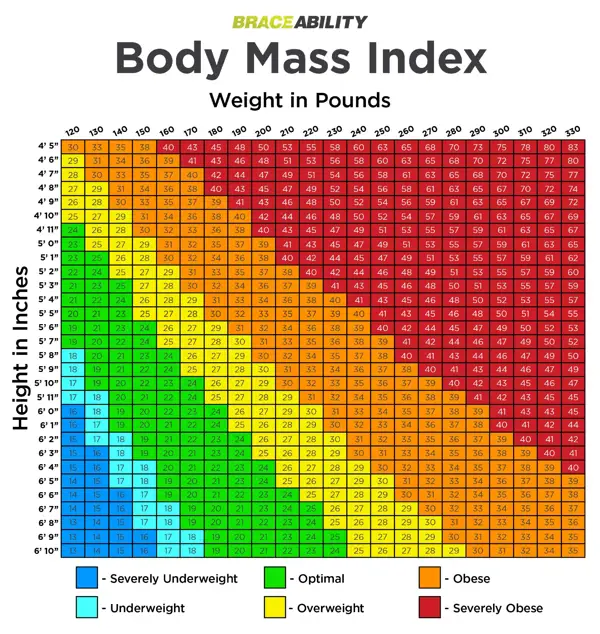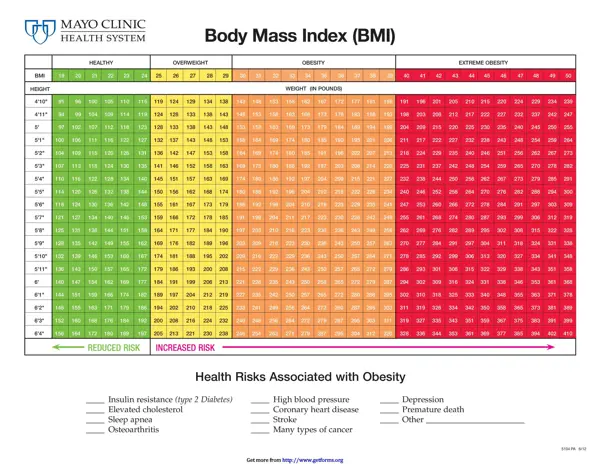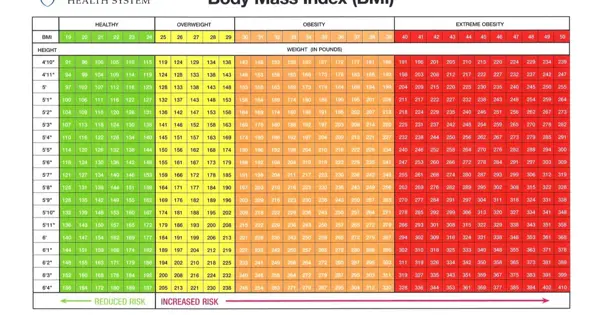Table of Contents
- Introduction to BMI
- How the CDC Healthy Weight BMI Calculator Works
- Understanding BMI Categories
- Limitations of BMI
- Using the BMI Calculator Effectively
- Benefits of Maintaining a Healthy Weight
- Conclusion
Introduction to BMI
BMI (Body Mass Index) is a widely used measurement to determine whether an individual has a healthy weight in relation to their height. It helps in identifying potential health risks associated with being underweight, overweight, or obese. The CDC (Centers for Disease Control and Prevention) provides a simple online BMI calculator to assess an individual's weight status.
How the CDC Healthy Weight BMI Calculator Works
The CDC Healthy Weight BMI Calculator takes into account an individual's height and weight and calculates their BMI score. By entering the required details, the calculator provides an accurate assessment of their weight status based on established criteria.
The CDC Healthy Weight BMI (Body Mass Index) Calculator is a simple tool designed to estimate an individual's body fatness based on their height and weight. It follows the guidelines set by the Centers for Disease Control and Prevention (CDC) to help assess a person's weight status and potential health risks associated with excessive body weight.
Using the Calculator
To use the CDC Healthy Weight BMI Calculator, you need to know your height and weight. Simply enter your values into the respective fields, and click on the "Calculate" button. The calculator will instantly compute your BMI and display the results.
Interpreting the Results
The BMI results will fall into one of the following categories:
- Underweight: BMI less than 18.5
- Normal weight: BMI between 18.5 and 24.9
- Overweight: BMI between 25 and 29.9
- Obese: BMI of 30 or higher
The CDC Healthy Weight BMI Calculator is a screening tool that provides a general indication of a person's body fatness. It is important to note that BMI alone does not account for factors such as muscle mass, body composition, and distribution of fat. Therefore, it should be used as a starting point for assessing weight status and not as a definitive diagnosis.
Consult a Healthcare Professional
If your BMI falls outside the normal weight range or if you have concerns about your weight, it is advisable to consult a healthcare professional for a comprehensive evaluation. They can provide personalized advice, considering other factors that may impact your overall health and well-being.

Understanding BMI Categories
The BMI calculator classifies weight status into four categories: underweight, normal weight, overweight, and obese. These categories provide a general indication of an individual's health status, but further assessments may be required for a comprehensive analysis.
The CDC Healthy Weight BMI (Body Mass Index) Calculator is a useful tool for determining whether your weight falls within a healthy range based on your height. It provides valuable information about your body composition and potential health risks associated with being underweight, normal weight, overweight, or obese.
BMI is calculated by dividing an individual's weight in kilograms by their height in meters squared. It is a universally accepted method to categorize individuals into different weight classes. The CDC provides the following categories:
- Underweight: BMI less than 18.5
- Normal Weight: BMI 18.5-24.9
- Overweight: BMI 25-29.9
- Obese: BMI 30 or higher
Understanding your BMI category is crucial as it can give you insight into potential health risks. Being underweight may indicate nutrient deficiencies or other health issues, while being overweight or obese can increase the likelihood of developing chronic conditions such as heart disease, diabetes, and certain types of cancer.
It's important to note that while BMI is a useful screening tool, it does not consider other factors such as muscle mass, body composition, and individual differences. Therefore, it is recommended to consult with a healthcare professional for a comprehensive evaluation of your overall health and weight management.
By utilizing the CDC Healthy Weight BMI Calculator, you can gain a better understanding of your current weight status and take appropriate steps towards achieving and maintaining a healthier lifestyle.

Limitations of BMI
While BMI is a useful tool for most individuals, it has limitations. Factors like muscle mass, body composition, and distribution of fat may not be accurately reflected in the BMI score. Thus, it's essential to consider additional factors when assessing an individual's overall health.
The CDC Healthy Weight BMI Calculator is a useful tool for assessing a person's weight category based on their BMI (Body Mass Index). However, it's important to understand that BMI has certain limitations and may not provide a comprehensive assessment of an individual's health or fitness level.
Here are some of the limitations of using BMI as a sole measure of health:
- Does not differentiate between muscle and fat: BMI does not take into account an individual's body composition, such as the distribution of muscle and fat. As a result, someone with a high amount of muscle mass may have a higher BMI, even if they have low body fat percentage.
- Does not consider body shape or fat distribution: BMI calculations only take into account height and weight, without considering other factors such as body shape or fat distribution. This means that individuals with a higher amount of visceral fat (fat around organs) may be at increased health risk, even if their BMI falls within the normal range.
- Does not account for differences based on age, sex, and ethnicity: BMI thresholds for determining weight categories are the same for all adults, regardless of age, sex, or ethnicity. However, these factors can affect the interpretation of BMI results, as certain populations may have different body composition norms.
- Does not reflect overall fitness or cardiovascular health: While BMI is a simple measure of weight in relation to height, it does not consider other important aspects of health and fitness, such as cardiovascular endurance, flexibility, or muscular strength.
- Does not account for personal circumstances or health conditions: Individual circumstances and underlying health conditions can influence the interpretation of BMI. For example, athletes or pregnant women may have different body composition and weight distribution than the average population.
It's important to consult with healthcare professionals and consider additional assessments, such as body fat percentage, waist circumference, and other health markers, to get a more accurate and comprehensive understanding of one's health status.

Using the BMI Calculator Effectively
To obtain accurate results using the CDC Healthy Weight BMI Calculator, it is important to provide the most up-to-date information about height and weight. Regularly checking your BMI and understanding the significance of the results can help you track progress towards a healthier weight.
The Body Mass Index (BMI) Calculator provided by the Centers for Disease Control and Prevention (CDC) is a useful tool to assess your weight status and potential health risks. By understanding how to effectively use this calculator, you can gain insights into your BMI and take necessary actions towards a healthy weight.
Steps to Use the BMI Calculator:
- Access the CDC Healthy Weight BMI Calculator page on the official website.
- Enter your weight in pounds or kilograms, and your height in feet, inches, or centimeters.
- Select your gender from the provided options.
- Choose your age range from the drop-down menu.
- Click on the "Calculate" button to obtain your BMI and its corresponding weight category.
Interpreting the Results:
After clicking the "Calculate" button, the BMI calculator will provide you with your Body Mass Index and categorize it as one of the following:
- Underweight: BMI less than 18.5
- Normal weight: BMI between 18.5 and 24.9
- Overweight: BMI between 25 and 29.9
- Obese: BMI of 30 or higher
Additionally, the calculator may indicate whether you fall into any specific risk categories associated with your BMI range, such as increased risk of developing chronic diseases.
Using the Results Effectively:
Once you obtain your BMI and weight category, it's essential to understand the implications and take appropriate steps for a healthier lifestyle:
- If your BMI falls under the "Underweight" or "Overweight" category, it's recommended to consult a healthcare professional to discuss potential risks and develop a suitable plan.
- If your BMI is within the "Normal weight" range, it's important to maintain a balanced diet, engage in regular physical activity, and adopt healthy habits to ensure your weight remains in a healthy range.
- If your BMI indicates "Obese," it's advisable to consult a healthcare professional to understand the potential health risks and explore suitable strategies for weight management and overall health improvement.
Remember, BMI is a general screening tool and may not consider individual variations such as muscle mass and body composition. Hence, it's always best to consult a healthcare professional for a comprehensive assessment and personalized guidance.
Using the CDC Healthy Weight BMI Calculator effectively can provide valuable insights into your weight status and potential health risks. By utilizing this information and making informed choices, you can work towards achieving and maintaining a healthy weight.

Benefits of Maintaining a Healthy Weight
Maintaining a healthy weight has numerous benefits, including reduced risk of chronic diseases, increased energy levels, improved mental health, and enhanced overall well-being. Understanding your BMI is a crucial step towards achieving and maintaining a healthy weight.
Conclusion
The CDC Healthy Weight BMI Calculator is a valuable tool for assessing an individual's weight status. Although it has its limitations, it serves as a starting point to gauge general health and provides a foundation for discussions with healthcare professionals. Monitoring and maintaining a healthy weight is important for overall well-being and should be part of an individual's wellness routine.
Key Takeaways
- Understanding your BMI helps identify potential health risks associated with weight.
- The CDC Healthy Weight BMI Calculator assesses weight status based on height and weight.
- Categories include underweight, normal weight, overweight, and obese.
- Additional factors should be considered alongside BMI for a comprehensive health assessment.
- Providing accurate information ensures precise BMI calculations.
- Maintaining a healthy weight brings various physical and mental benefits.
- Regularly monitoring your weight helps track progress towards optimal health.
Frequently Asked Questions
-
Can BMI alone determine overall health?
No, BMI is a helpful indicator, but additional assessments such as body composition analysis are recommended for a more comprehensive understanding of health.
-
Does the BMI calculator account for age or gender?
No, the CDC Healthy Weight BMI Calculator solely relies on height and weight. Other factors, such as age and gender, may be relevant when discussing results with a healthcare professional.
-
Should pregnant individuals use the BMI calculator?
The BMI calculator is not applicable during pregnancy, as weight and height requirements differ for pregnant individuals. Consult with a healthcare provider for personalized guidance.
-
What is considered a "healthy" BMI range?
A BMI ranging from 18.5 to 24.9 is generally considered within the healthy weight range.



Recent Comments